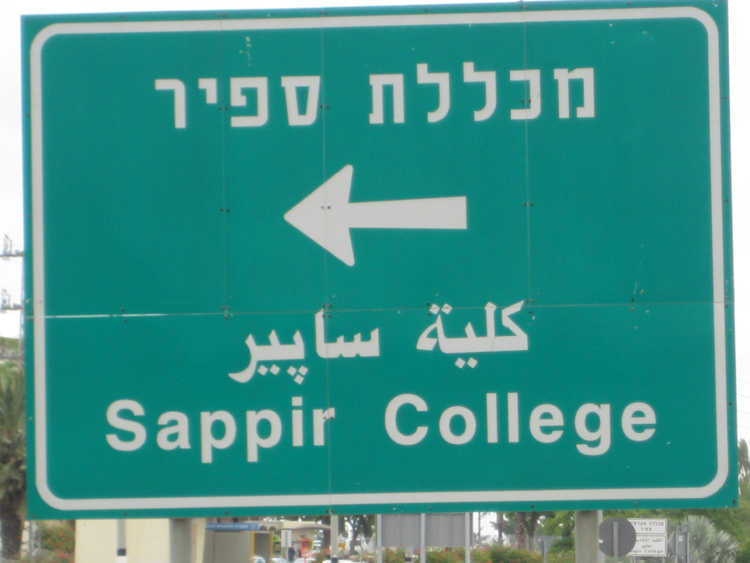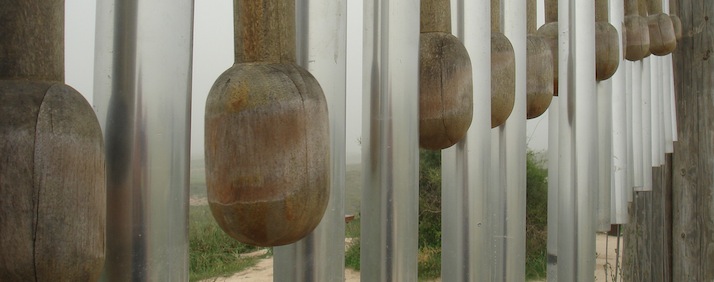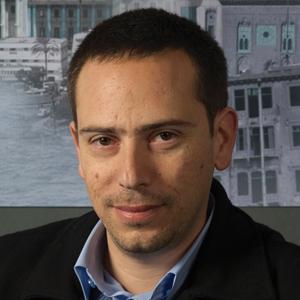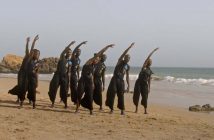What is your feeling about Osvalde Lewat’s film?
Well, you ask the million dollar question! I was surprised to see me and the school and my position within the structure from Osvalde’s point of view. It is what’s beautiful about cinema!
Does it serve or dis-serve the school?
It helps in the sense that more people get to know what we do here in the South of Israel. The Festival is already quite known in circles in Europe. It’s funny because people in Paris know better what’s going on in the school than people here in Tel Aviv!
Would you have taken the same point of view?
The school is a part of my family: I wouldn’t do a film about it; it is too close, too intimate.
A lot of documentary films do that.
Yes, but I don’t really like that. I can only handle it when the private sphere and the public sphere connect together, when your private life somehow captures the Zeitgeist of the society. I was surprised when Osvalde came to me with the idea of making film about the school. It happened because of the festival: I saw Black Business in France and called her to invite her. She was totally surprised. She has never been to Israel before. When she was at the festival, she was in a total shock. I think it was a kind of life changing experience for her.
Does the fact that she is an African woman make a difference for you?
The festival is focused on the three continents: Latin America, Asia and Africa. Finding good films from Africa is not easy these days. Sderot is inhabited by Jews from Africa: Algeria, Morocco, Ethiopia
Do the students of the school tackle the issue of these identities?
Yes, because Israel is a nation of immigrants who had to curb their own identity to be Israelis and what we are doing now is going back to our original identity, our own roots, the language that we have never talked, to know who we really are. This is the kind of film that is made here. Films of hybrid people, half Israeli, half something else. This is what Freud called « the return of the repressed ».
When you present the school outside, what are your main points?
First and foremost, we are a kind of alternative to the hegemonic center, not only in the subject matter, but also esthetically. As we are on the periphery, very close to the border with Gaza, we have this little laboratory of our own: we can explore things. We are not afraid of difficult subjects and to open old wounds. This is basically what we do here, in contrast with what is going on in the rest of the country. People from the center think that it is a kind of weakness, giving up the prestige of the conventional aesthetic and big festivals
You say in the film that it is important to show the pain of the people in order to let them think. Is that the way that you are tackling reality?
Yes because the main problem in Israel today is, as a good friend told me, that the people think that they think. We are not really thinking. We are not taking chances and risks. If we want to break down with the old habits, with the old politicians, you need to explore new things. In cinema, there is something for this: le montage interdit, forbidden editing.
The expression is by André Bazin. Is that what you mean?
Yes. But Bazin’s concept changed over time through Serge Daney’s montage obligé and lately it has taken shape through the work of the Israeli filmmaker Eyal Sivan. And to me, montage interdit means putting things next to one another like never before and to see if we can understand something from history, from politics and not let the bad part of history repeat itself. This way of thinking through images, through forms is the ideal thing to do for a school: always be searching. If we are not searching, there is no reason for the school to exist. We don’t know the outcome, what our films should look like. We are definitely trying to find out, time after time.
Is there a certain choice of how filming is taught in the school?
As funny as it may sound, we have a lot of freedom. We have a variety of teachers, from the radical mainstream to the radical avant-garde. The idea is that the students need to find the aesthetics they want to adopt. Because in other schools, there is a certain agenda, a way of doing. Here, they take responsibility, and sometimes they fail, but that is also an important lesson. We are not afraid to make mistakes. It’s part of filmmaking and it’s part of life. This is the main difference with the other teaching methods in Israel.
There is a Palestinian feminist in the film who says that film is a weapon. Do you agree with her?
Yes, absolutely. As Glauber Rocha said. Now even more than before. We are in a world of images and we speak to each other through images. We should fight with images. Film has a tremendous impact on consciousness. It is a weapon, a goddamned good one!
At the end of the film, Avner says that the dialog the school tries to instigate is a utopia. Through cinema, people who don’t talk in other places interact. Isn’t this dialog contradictory to the violence which is seen as a weapon in the film? Or, in other words, is a kind of violence necessary to start a dialog?
The process is that the students get to know themselves before they use the camera and the editing table. You need to have a point of view in order to make films. Israel is a very monolithic society. To break it, you have to use hammers. The students come to the school after three years in the army. They come totally brainwashed and you have to break this shield. Not to change their points of view, but just to help them create one. I don’t care if it is the radical left wing or right wing. It’s irrelevant to me. But they need to acquire some knowledge and to have an opinion about things in order to be able to tell stories. You can understand that this process is a very violent one. At the end of the road is montage interdit. Imagine that I speak about the Nuremberg Trial, and that I juxtapose it with the Algerian war, and Vietnam, and the occupation. It starts to be confusing for them, but they are starting to think. Cinema breaks taboos and lets you think. We bring also a variety of filmmakers. Imagine a dialog between a conventional filmmaker and an avant-garde filmmaker in front of the entire school. Sometimes they can shout at each other, but it’s about cinema and also about politics. We are on a volcano, waiting for it to erupt.
My question was coming from the fact that a lot of films today deal with some kind of dialog, for instance through music, with an orchestra bringing together Jews and Palestinians. A kind of essentialism of reconciliation. Peace without confrontation
Yes, and it’s bullshit. One day, we might do those films. But only after a big process of understanding the history and each other’s identity and going through each other’s wounds. Then, after being there, we can make reconciliation. Right now, it’s like fighting cancers with pain killers: it’s too easy.
At the end of the film, it is said that the school is a utopia for a different Israel. How do you explain this?
As we said earlier, what is going on in the school is quite the opposite to what is going on in Israel. What you learn in schools in Tel-Aviv, Haïfa or Jerusalem is quite the same, in the deepest sense of the meaning. The main game today is capitalism: everybody wants to be successful and make a lot of money. We forget that Israel is rated second in the western world for the gap between rich and poor and the extent of poverty. Solidarity between people is starting to crumble, while what they teach us in schools is that solidarity should be maintained. The politicians’ usual solution is to go to war every now and then. What we teach here is quite the opposite. We need to find different narratives and think again from the beginning. The young generation has to work out the new things which are going to unite this fragmented society. It’s a difficult process.
Israeli cinema is going to change very soon. Right now, it is the question of the financial aspect because the film funds are totally under the State concept. They give money to the kind of films that serve the hegemonic logic. But if we break down the financial aspect, you will see films with new perspectives on the society. The old generation is going down.
The film’s commentary says that only 15% of the films produced in the school are on political issues. Is that frustrating for you?
Everything has to be related to what’s going on in the country as a whole. The number is growing and we are also changing in order to be more precise about what we are looking for. Those changes are going on right now. We have already changed a lot since the film was made. We have an idea where we want this place to go. It’s part of a big cultural center that we are building here in the South of Israel on the border with Gaza. Hopefully one day, we will have a branch in Gaza.
Do you have special relations with African filmmakers and their films?
The main connection goes through Europe: friends who know perfectly well what’s going on there. I’d like to go to Fespaco, but I need to work on my French first. I’d like to invite Alain Gomis this year, to show his work and to talk with our students. He also is a hybrid individual like we all are in Israel!
///Article N° : 11914











